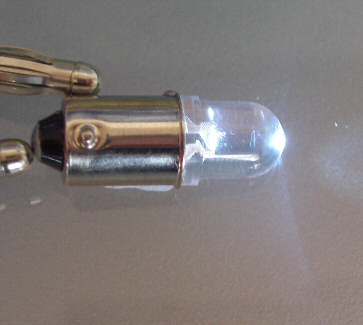'Wireless' 2Mbps Internet Using Blinking LEDs
Get your blinking internet working.
The amount of freedom we have with our laptop computers these days compared to a decade ago is remarkable. Thanks to Wi-Fi and even more so now with 3G networks, we can access the internet from almost anywhere. But what if all those electromagnetic waves are undesirable to you? Then perhaps blinking lights are more to your liking.
Chinese scientists have demonstrated a wireless networking method which uses blue LEDs that transmit data by modulating flicker rate. The LED lights can double as lighting as the blinking is imperceptible by the human eye.
The speed so far achieved through blinking lights is 2Mbps, which is quite sluggish by today's other wireless standards. Also, instead of worrying about radio signal interference, now the concern will be the blocking of light transmission.
Still, it's an interesting concept. Read more from the Beijing Times.
(Via Engadget)
Get Tom's Hardware's best news and in-depth reviews, straight to your inbox.
-
stridervm Great, more ammo for the paranoid... Saying they're sensitive to lights, so no net based on LED's...Reply
Seriously..... Although it sounds cool, I think it's not so practical as LED's have generally low lifespans especially when they're almost always blinking. -
N.Broekhuijsen stridervm it's not so practical as LED's have generally low lifespans especially when they're almost always blinking.What planet are you from?Reply
LED's have amongst the longest lifespans of any bulb on this planet.
-
Blessedman ??? LED's have generally low lifespans? I was under the impression that LED's had the highest lifespan of all lighting methods.Reply -
CTPAHHIK Hospitals do not allow cell phone or wireless technologies of any kind because it interferes with medical equipment that also uses wireless on same band. If this technology proves to be reliable it would be an alternative to prevent interference.Reply -
Verrin ReplyBut what if all those electromagnetic waves are undesirable to you? Then perhaps blinking lights are more to your liking.
Uh, aren't "blinking lights" still emitting electromagnetic waves? =p -
twisted politiks stridervmGreat, more ammo for the paranoid... Saying they're sensitive to lights, so no net based on LED's...Seriously..... Although it sounds cool, I think it's not so practical as LED's have generally low lifespans especially when they're almost always blinking.Reply
generally low life spans? are you talking about LED's that last 25,000 hours (and still shine 70% of what they were at when new after the 25,000 hours) ,or halogen and incandescent bulbs which typically burn out at 1,250 and 2,500 hours, respectively?
As far as i knew, LED's are the most efficient man-made visible light source we have. -
twisted politiks VerrinUh, aren't "blinking lights" still emitting electromagnetic waves? =pReply
yes but at a much longer wave length, thus being a lot less "harmful" if you can call wireless harmful. -
peanutsrevenge This seems like a dead end technology IMO, walls are a major issue for radiowave wireless, using light for the medium would require a new wall building method, possibly using fibre optics running through them.Reply
Dead end!

